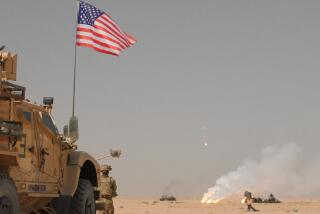‘Obama’s War’ is a tough one
- Share via
“Frontline” checks in tonight with a gloomy assessment of the war against the Taliban in Afghanistan and an equally pessimistic view of whether the U.S. can prod/seduce/jawbone/bribe the Pakistani government into truly confronting Al Qaeda forces in its border region.
In political terms, the title says it all: “Obama’s War.”
President Obama has called Afghanistan “a necessary war” compared with the war in Iraq, which he opposed and vows to end. The rhetoric helped squelch Hillary Rodham Clinton -- an early supporter of the Iraq war -- in the Democratic primaries and defeat the hawkish John McCain in the general election. But matching lofty rhetoric to on-the-ground reality has proved difficult for the new commander in chief. A new policy was announced in March; now a second new policy is being devised as political and military power brokers wage war through leaks to newspapers and bons mots on the Sunday chat shows.
“Obama’s War,” a top-notch report with ace correspondent Martin Smith, tries to give both sides in the debate a fair shake: the military leaders who say more troops are essential, the doubters who say the nation-building effort in Afghanistan is a flop and not worth deploying tens of thousands more troops.
The true enemy of the U.S. is lurking not in Afghanistan but in Pakistan, “Obama’s War” suggests. “In Afghanistan, we know what to do; we just don’t know if we have the resources or the time available to do it,” says David Kilcullen, counter-insurgency expert and advisor to the U.S. military. “The problem in Pakistan is we’re not really sure what to do.”
Historically, the Pakistan military and intelligence service have shown an affinity for the Taliban and Al Qaeda as allies in the Pakistanis’ struggle with their arch-enemy: India. The U.S. has sent billions of dollars to Pakistan in hopes of changing that mind-set.
Gen. Stanley McChrystal, the top U.S. officer in Afghanistan, thinks the Pakistanis have found the resolve to attack the Al Qaeda strongholds. But one of McChrystal’s top advisors, Andrew Exum, adds a discouraging nuance. The Pakistanis, he said, are ready to attack Al Qaeda when it threatens the stability of their government but “they do not share our interests as of yet in taking an aggressive stance against the groups that are seeking to destabilize Afghanistan.”
The normally talky Ambassador Richard Holbrooke, U.S. special representative for Afghanistan and Pakistan, goes mum when Smith asks him for proof of his assertion that the Pakistanis are serious about attacking a powerful Al Qaeda stronghold in north Waziristan.
John Nagl, retired U.S. Army lieutenant colonel who wrote the foreword to the military’s latest counter-insurgency manual, is unrestrained when asked about the Pakistanis and their truthfulness or lack of it. “I absolutely have to hold my nose when I work with the Pakistani government,” he said.
New Yorker writer Steve Coll summarizes: “This could not be a more complicated war. If you think about it, the United States is essentially waging a war against its own ally. The Taliban are a proxy of the government of Pakistan. We are an ally of the government of Pakistan. We are fighting the Taliban.”
--
--
‘Frontline: Obama’s War’
Where: KCET
When: 9 tonight
Rating: Not rated
More to Read
Sign up for Essential California
The most important California stories and recommendations in your inbox every morning.
You may occasionally receive promotional content from the Los Angeles Times.













